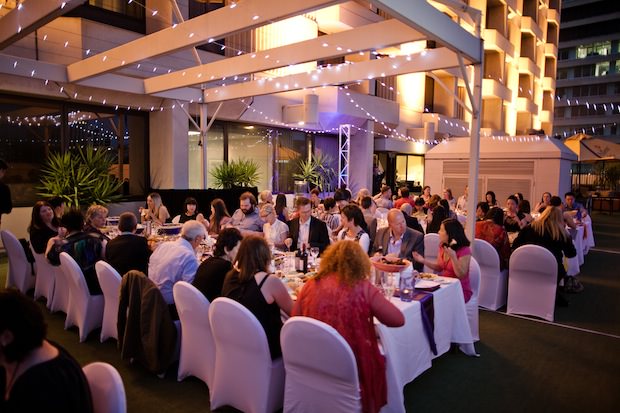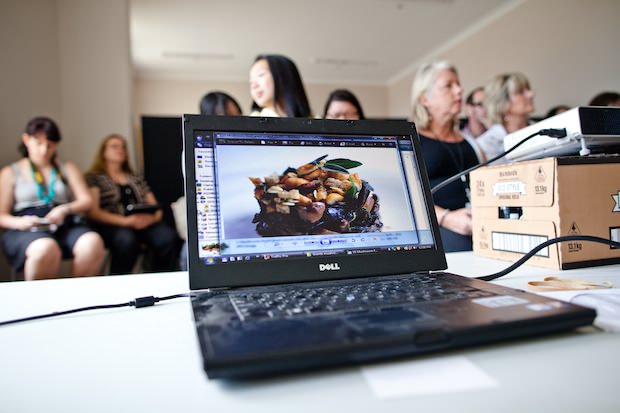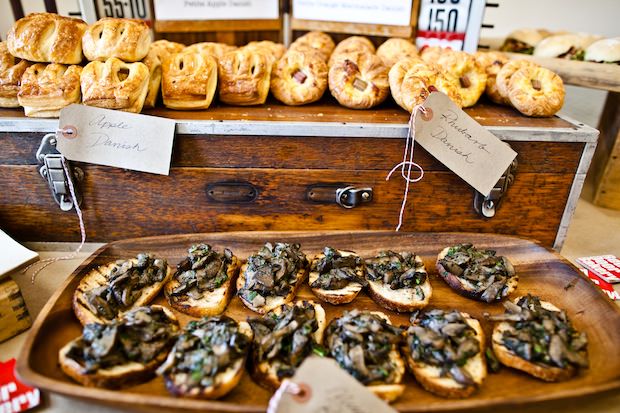This is not one of my usual recipe or travel posts. If you’d rather read one of those please click on the links or check out my archives.
The session that sparked the liveliest discussion at the 4th Australian Food Bloggers Conference (Eat Drink Blog 4) last weekend in Perth was a panel on ethics and working with PRs. It seems that there’s nothing more divisive in the blogging world than a discussion about bloggers and money and commercial vs non-commercial blogging.
On one side, we had Cyn aka The Food Pornographer (disclosure: Cyn is a close friend and member of the Servved advertising network I am part of), who selectively works with food and travel companies on her blog. On the other, there was Phil from The Last Appetite, who does not accept any form of sponsorship or advertising on his blog.
In a nutshell, Cyn’s take on it was that if you can work with brands and maintain your integrity if you are extremely selective, completely transparent and maintain 100% editorial control.
On the other hand, Phil felt strongly that any form of sponsorship or gifted products, services or experiences is potentially a corrupting influence. He was also concerned that a gifted product or trip is not a ‘true’ experience or one that bloggers would actually pay for. Part of Phil’s hardline approach is due to a conflict of interest between his blog and his day job working for a state tourism company.
Before I share my response, please note that I currently freelance for food, media and tourism companies (brands). Previously I worked in general management, marketing, fundraising and PR. I’ve been paid to write for 15+ years and I’ve been blogging for 2.5 years.
Let’s start with some definitions, shall we? These are mine; they may be different to yours.
Definitions
- Gifted – this is when a brand supplies a blogger with a free product, experience, meal or service so they can experience it and perhaps review it. Or perhaps the brand provides a product for a giveaway or invites the blogger to a dinner, launch or event. There is no contract between them.
- Famil – this is when a brand supplies a blogger/journalist with a free travel experience so that they can familiarise themselves with the destination and hopefully blog/write about it. Typically this includes flights, transfers, accomodation, meals and entertainment. There is no contract between them.
- Sponsored – this is when a brand pays a blogger to blog, tweet or share information about the brand. There is a contract between them. The content is delivered through the blogger’s own blog and social media channels.
- Commission – this is when a brand pays a blogger to develop content about the brand. There is a contract between them. The content is delivered through the brand’s own website, marketing material and social media channels.
- Advertising – when a brand pays for ad space on a blog. Typically in the form of banners, squares/tiles or leader boards, ads are a paid promotion of a brand and covered by a contract.
I’ve worked with brands in all of the above ways.
Why do some bloggers choose to be commercial vs non-commercial?
Bloggers who choose not to engage with brands usually do so because of one or more of the following reasons:
- Blogger has a full-time job that pays the bills and is unrelated to their blog. Blogging is a hobby and he/she wants to keep it fun.
- Blogger is a writer/photographer/stylist and wants to keep their blog somewhere to ‘play.’
- Blogger wants to be able to blog about anything and does not want to feel restricted in any way.
- Blogger believes it’s impossible to work with brands without ‘selling out.’
- Blogger believes doing things on his/her own dime is a more genuine experience.
- It would conflict with blogger’s day job in the food, tourism or PR industries.
In October 2012 I spoke at the Adelaide Beauty Bloggers Conference on a panel called ‘Blogging for Fun and Profit.’ I can’t speak for all commercial bloggers but the video sums up why I’ve gone down the path I have pretty well.
http://www.youtube.com/watch?v=ayOEhgmmFCw
Common criticisms of bloggers who work with brands
Phil touched on some of these during the Eat Drink Blog 4 session. Other bloggers will no doubt have different views but my personal response is as follows.
#1: Bloggers have no integrity; they’ll blog anything for a freebie.
No. I turn down 95% of invitations and offers. I am extremely selective about the brands I do work with. Integrity and professionalism have nothing to do with a job title — in this case, ‘blogger’ — and everything to do with a person’s character.
#2: Bloggers don’t do their own research; they take the press release as fact and don’t bother looking beyond it
Before I agree to work with a brand I Google the company and spend some time reading through anything that might tell me more about the company and/or product or destination. Because, as with any job, I’m interviewing them as much as they are interviewing me. And I only want to work with people and companies that are a good fit with me and who will do the right thing by me.
#3: Bloggers promote or blog products or experience that they would never pay their own money for
No. I only blog things I would recommend to my family and friends. With regards to famils and sponsored travel, I think Cyn said it best during the Eat Drink Blog 4 panel discussion when she said she has a bucket list of hundreds of places she’d like to visit but the reality is she’s unlikely to be able to visit them all on her own coin. So if the right opportunity to visit a place on her list came up she would consider it. I would, too, because a trip could be a great fit for my food & travel blog. On the flip-side, I’ve turned down countless free meals because I only write about restaurants in the context of a story or a travel experience. So I won’t accept free meals I know I would never blog. For me (and Cyn) it’s all about it being a good fit.
#4: Even if the blogger is not being paid, there is an implied reciprocity in any gifted product or service i.e. you scratch my back, I’ll scratch yours.
Yes and no. If a company supplies me with a gifted product or experience they are enabling me to experience it but they are not paying for my time or my expenses. There is no contract between us so I don’t feel obliged to them and won’t be pressured by them. Having said that, I rarely accept gifted products, invitations or services nowadays because I find it easier to manage expectations this way.
#5: Bloggers blog or tweet about products and places and you never know if they’re being paid to do so or not.
I disclose any commercial or personal relationships that may influence something I’ve posted on my blog. I usually work a statement explaining the relationship into the beginning of a blog post and end with an explicit disclaimer outlining any freebies or compensation. At the conference one speaker mentioned that he’s seen some bloggers tagging certain Tweets or Instagram posts with hashtags like #gifted, #sponsored, #clientwork, and #mywork. I think this is an excellent idea and will do so with all relevant posts on these channels from now on.
Now let’s look at some examples of bloggers and brands working together successfully and unsuccessfully. I’ll start with the unsuccessful ones.
Brand & blogger fails
The ‘Machine Gun’ Approach
The brand/PR agency/blogger agency sends out a media release, invitation or giveaway offer to every blogger they can find an email address for. The email is not personally addressed and the sender has not bothered to determine whether the release is in fact a good fit for the blogger.
I call this the Machine Gun approach because the brand/PR agency/blogger agency is basically scattering a group of bloggers with their release and hoping some of it hits their target.
In my opinion, this is a lousy way to do business. Unlike journalists, bloggers are not always on the lookout for a new story. So you might get some bloggers picking up your story — especially if you offer free product — but more experienced bloggers won’t touch these types of ‘opportunities’. Why would they want to blog the same story as everybody else? It’s not interesting, it doesn’t make good content and readers get put off.
The ‘But We Love You!’ Approach
The brand/PR agency approaches an individual blogger or group of bloggers with a pitch that goes something like this: “We love you, we love your blog, and we think you’re awesome. We want to develop a great relationship with you so we have this UH-MAZING opportunity for you where you promote our brand for us. We want you to blog a recipe using X product or write a story about X on your blog that we can also publish on our brand website. Unfortunately we have no money to actually pay you but we will link back to you and fully credit you.”
As a full-time freelancer, pitches like this make me cross because the agency is essentially commissioning a story/blog post and leveraging the blogger’s skills and influence but saying they have no budget for it. I never do these stories because I won’t work for free for profit-making companies. Check out Catherine Deveny’s post on why she won’t work for free.
I know we all have to start out somewhere and I’m not saying you should never work or write for free. In the mid 90s I spent my university holidays volunteering at a local arts festival and my free time volunteering for a local singing group and both gigs led to to my first job in marketing & PR. I also wrote for the Adelaide University newspaper for two years as a volunteer contributor before becoming the paid co-editor in ’96. So I do get it.
But if you’re a blogger be strategic and selective about the companies you do work with. Ask yourself how much your time, skills and influence are worth and don’t be scared to say no to ‘opportunities’ that aren’t a good fit. As time goes on and your skills and experience grow, saying no to the little opportunities may help you land the big ones.
How brands & bloggers can work together
In my biased opinion — and we are all biased in some way — sponsoring, commissioning and advertising with bloggers (3, 4 and 5 on the list above) are by far the most effective way bloggers and brands can work together.
Unlike gifted products, event invitations or famils, the expectations and deliverables on both sides can be clearly communicated and explicitly stated in a written contract. This way, brands don’t feel let-down and bloggers don’t feel pressured to post.
Commissions
A commission is very straightforward and effective way for brands to work with a blogger. A brand like what the blogger does (recipes, writing, photography, styling, blogging, social media etc) and hires him or her to do it for them. This content is then promoted via the brand’s usual marketing channels. The brand gets the custom content they were after as well as the positive association of working with the blogger, regardless of whether the blogger blogs about the project or not.
Sponsored Content
Sponsored content is a little trickier. Because it’s going out on the blogger’s blog and social media channels the effectiveness of sponsored content depends entirely on whether or not it’s a good fit and the authenticity of the message.
I read blogs because I love the little window they give me into another person’s world. I read blogs to be inspired, to learn something new, to be entertained and to be moved: I don’t read blogs for a re-worded media release (and I’ve written plenty of those in a former life).
Brands are used to telling their story in their own words. When they engage with bloggers they are passing the conch to the blogger so that the blogger can tell the brand’s story in his or her own words. That can be scary for a brand but smart brands understand that they do not fully control their image anymore. True authenticity requires the sharing of warts and all and consumers are more likely to trust brands that are comfortable with this approach.
Personally, I believe sponsored content works and is credible when it’s written in the blogger’s own voice without any external interference from the brand. That means no approval by the brand before publication or any editing done after publication because the brand is unhappy with the way their brand or product is portrayed.
The blogger also needs to be comfortable with what they they’ve agreed to do: if they’re not, a certain self-consciousness or over-perkiness can creep into their posts, making them less genuine.
Advertising
Blogs are free to read but can be costly to maintain. Apart from the thousands of (mostly unpaid) hours I’ve devoted to this blog I have a whole book of receipts related to blog expenses like hosting, camera equipment and accessories, external hard drives, card readers, props (painted wood, table linens, flat ware, crockery etc), kitchen ware, food costs and so on.
Some bloggers like to offset their blog expenses by running advertisements on their blogs. Some, like me, join an ad network, while others sell ad space directly to brands themselves via their blogs.
For brands, the ability to tap into a blogger’s influence and audience through advertising can be very attractive. Advertising is a good choice for brands who want to align with bloggers while retaining more control of how they are presented.
6 tips for brands who want to work with bloggers
- Don’t just send a suggested story idea to every blogger in your database and say ‘please consider using.’ This is lazy and ineffective and it completely devalues the brand in my eyes.
- Do your research. Only approach bloggers that have blogged similar stories to the one you are going to pitch them and reference these posts in your customised approach.
- If you are sending out event information or invitations, make sure the bloggers you approach live in the same state and might actually be able to attend your event (or send them a plane ticket).
- Ask yourself, what’s in it for the blogger? Why would he/she care about my brand?
- If you’re sponsoring or hosting a blogger event, think about ways to really make your brand experience special and immersive. The extraordinary always gets talked about.
- If you’re promoting a product remember that bloggers love experiencing things for themselves. So don’t just send them a media release and say you can supply high-res images. Offer them a trial or sample so they can try it for themselves.
6 tips for bloggers who want to work with brands
- Treat your blog as a portfolio. Create blog posts that showcase the breadth of your skills.
- Create an About page with a photo that helps to establish your credibility and authority. Don’t write about the time you woke up half-naked out in the middle of nowhere and definitely don’t display a photo of said event. Instead, talk about the work and life experiences that you’re most proud of. Better yet, create a separate portfolio site and list your services, clients and testimonials. Here’s mine as an example.
- Make sure you make it easy for people to get in touch with you. I’m amazed at the number of blogs that still don’t include an email address or contact form.
- Don’t respond to unpaid pitches with: “Are you out of your freaking mind?” Instead, try: “Thanks for your email and for thinking of me. Unfortunately I don’t work for free so this particular project is not a good fit for me. However, if you have a project with a budget I do hope you’ll consider me.” This way you make your position clear but still leave the door open.
- Know your worth. Work out how long it takes you to write a post, develop, cook and style a dish (if you do recipes), and shoot and edit photos. Work out your hourly rate and how much your time and skills are worth. Research going rates in the industry and chat to fellow bloggers. Don’t be afraid to negotiate an offer or to go back to them with suggestions of other ways to work together. And put everything in writing – I have lengthy Terms & Conditions that I send out with every requested quotation. Protect your own interests just as the brand is protecting theirs.
- Maintain 100% editorial control of your blog. Never give this up.
Let’s do it better
If you’re a blogger and you want to work with brands, make it easy for brands to find you and assess whether you’d be a good person to work with. Be strategic about everything you post, remembering that you never know who is out there reading your blog; while most of my work happens off my blog nearly all of my current clients have found me via my blog.
In terms of accepting freebies or payment, ultimately only you can decide what you feel comfortable with; I’m blogging to continue the conversation, not to lay down the law.
For brands, please do your homework before you approach bloggers. Right now I’m deleting 95% of your pitches because they are simply a poor fit.
I believe that it is entirely possible for brands and bloggers to work together in a way that is effective, mutually beneficial, respectful and collaborative. Unfortunately, this is far from the norm.
Let’s do it better.
Thanks to Cyn, Phil, Erin, Ed, Ai-Ling and Matt for the conversations at Eat Drink Blog 4 that inspired this post.
More posts about blogging
- How to blog about food: useful tips for new, emerging and aspiring food bloggers
- Where to next for the Australian Food Bloggers Conference?
- What I Learned at the 2nd Australian Food Bloggers Conference
- The Complete List of Adelaide Food & Wine Blogs
Subscribe to The Hungry Australian
Don’t want to miss a post? Sign up to receive new posts 2-3 times a week – it’s FREE.
Disclosure
Eat Drink Blog 4 was free for delegates to attend. All conference meals and drinks were sponsored and gift bags were also provided for delegates. I paid for my own travel, accommodation and additional meals/expenses.
Thank You
Grateful thanks to the EDB4 committee members for their hard work in organising the event, the speakers for sharing their knowledge and expertise, and the sponsors, without whom EDB4 would not have been possible.
Comments? Questions?
Are you a blogger, a PR agency or a brand? What’s your approach? Share your thoughts below.















